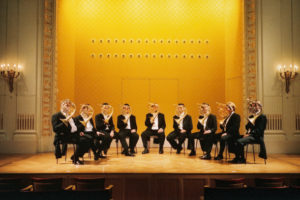I’ve said these things before, for instance. But they need to be said again, following up on my last post, about a quick way to improve almost any publicity pitch.
What’s in today’s post:
- Classical music publicists don’t know how to say why we should care about the music they publicize.
- This problem afflicts the entire field of classical music. We don’t know how to say why anyone should care about the music we love.
I can help with this problem. I deal with it in my consulting work.
A big problem with classical music publicists, captured in a single anecdote:
Some years ago, when I was still an active journalist, an estimable pianist recorded all the Beethoven sonatas. “Estimable” means respected, known (at least to musicians), but not someone who’d set your heart or mind on fire.
Someone who worked for a veteran classical music publicist phoned me, to ask if I’d review this multi-CD boxed set.
I asked if there was anything about the recording that might interest me. “What’s his approach to the sonatas? What does he do with them?”
No answer. The caller didn’t know. I’m going to guess that her boss didn’t know, either, and that no one in the company had thought of what the recording was really like. Certainly there was nothing about that in their press release for the album.
And that’s the problem
Classical music publicists — for the most part — don’t tell us what makes the music they rep worth hearing. That goes for a small publicity office, trying to help smaller clients, and just as much for the leading publicity firms, representing major orchestras and opera companies.
What’s compelling? They can’t say.
Go here to see a press release from a major classical music publicist, announcing the new season at one of our top orchestras. It’s 12 pages long, a sea of words, nearly unreadable, nothing but names (of performers and pieces) and dates. Nowhere in it is there a spark of humanity, or anything to show that the people mentioned truly love the music they play. [This link is now fixed. Sorry for any bother my mistake caused.]
This is a problem that in fact afflicts our whole field. To some extent, we’re on automatic pilot, performing the same music over and over. So even when we sincerely love it — as many musicians, people in the audience, and administrative people (including publicists) do — we don’t know how to say why others should love it as well.
Try an experiment

A new style classical music PR photo, meant to be lively, but really meaningless. What can we expect from this guy’s cello playing? Silly stunts?
Ask a classical musician why anyone should come hear them play. Or, if you’re a musician, ask yourself. Very likely, you won’t be able to say.
Often I hear, “Well, I’m playing great music.” But so is everyone else! Or else, “I’m really good.” (Usually put, especially in press releases, in fancier words.) But others, too, are good.
What’s distinctive about you? What can you offer that no one else can?
It doesn’t have to be something earthshaking. It can be something modest, as long as it’s truthful, and comes from your heart.
If you can’t answer this question, then why should anyone come to hear you?
And if we as a field can’t answer it — if we can’t say why anyone should care about classical music — we’re doomed. How will we ever build a new audience?
And no, it doesn’t help to say we offer timeless masterworks. Those are empty words. What do they mean? What, exactly, about this music is timeless? And what, exactly, would someone get from hearing it?


It’s similar to political consulting. We always ask a candidate two questions. First, what do you say to someone riding in an elevator with you about what you do and why they should come to your concert or buy your CD.
Second, you have one minute to explain your work to 60,000 people while you stand in the middle of Yankee Stadium.
In all my years of consulting on candidates and issued, no one successfully answered these questions.
After two weeks of work with them, they could.
My favorite pet peeve is publicizing a composer as “Pulitzer-Prize winning,” as if that will make people want to hear their composition
I’ve heard quite a lot of works by Pulitzer-Prize winning composers. Most of them were rubbish.
So many readers start with the premise that the music is boring and the releases just reinforce this notion. Saying it’s exciting doesn’t make it so. My pet peeve is with 600 word bios that are nothing but lists of where someone performed, and with whom. Dear God.
The following is a little off-topic because it’s promo copy for a jazz performance, not a classical music concert, but it’s Kennedy Center promo copy, which is why I can’t believe it’s so godawful. (And I happen to love this musician, which is one reason I’m leaving out his name).
[So-and-so], recognized by the MidAtlantic Arts Foundation as its 2015 BNY Mellon Living Jazz Awardee and who played with Miles Davis in the 1970s . . .”
Never mind that the MidAtlantic Arts Foundation isn’t exactly the Nobel Committee and that the awkwardly named award requires an Internet search. That sentence isn’t even grammatical. In general the Center’s copy is wordy and not infrequently purple. It boggles my mind that a leading organization would publish stuff this bad.
Since I live in DC, I see many examples of what you’re saying. The Kennedy Center isn’t alone. We’d see the same thing at other big arts centers. I’d say that fixing this is simply not a priority. They’re doing a big construction project now. If something went wrong — if a contractor turned out to be substandard — you can bet that would be fixed ASAP. But the publicity machine just grinds out stuff that doesn’t work.
(“Pulitzer-Prize winning” makes as many NOT want to hear as to hear.)
As a pro reviewer of classical concerts for a decade, I have concluded that just having the music played in a live setting (you know — ACTUAL music as opposed to RECORDINGS of actual music) is good enough if the performer has decent skills and charisma. Live music, actual music-making, is not as common around my neck of the woods as it was decades ago. You don’t have to be Horowitz to make the magick happen. You just have to play great music and be good enough to get it across. The rest is gravy.
Few classical musicians can tell you anything about what they do and/or why. There have been a few famous exceptions like Leonard Bernstein and Itzhak Perlman, but most are strangely inarticulate about their craft. I also noted this when I wrote my first book about Black classical musicians in Philadelphia. One particularly engaging performing I interviewed was particularly mute about their craft, and I had to do some heavy editing to eliminate “you know…” and, “it’s like….” from the interview. You could blame music schools and the entire classical music industry for promoting this sameness and dullness across the board, particularly in orchestras, where uniformity of playing and personality is expected and desired. Orchestras not only sound, but look alike, since true diversity is not desired in spite of well publicized claims to the contrary. Relying on silly, sexy, or just plain weird gimmicks to make classical musicians look cool, interesting, or whatever, hasn’t produced any real change in the dullness we see today.
There is probably no form of prose in the world that makes the eyes glaze over and the mind to turn off like the performer bios that managements send to be used in concert programs and publicity. I’ve hardly ever seen one that isn’t a list of piece performed and places where those performances took place–last season, this season, next season–accompanied by a few phrases from extravagantly positive reviews (though these, too, reveal less that one might wish). Rarely do the give the remotest inkling about the personality of the performer or any of his or her interests other than playing this endless list of piece in an endless succession of concert venues. What an absolute waste!!
Love this! A lot of conjecture on the issues in classical music – from repertoire choices, academic format and principles of teaching, audience stuffiness, outdated performance techniques etc., etc. Excellent to see an experienced industry-based critique. A mildly harsh condemnation of the musicians themselves, but perhaps a necessary question that needs to be asked more.
To answer your question, my personal USP is not answering to previous musicians by listening to recordings of works, and therefore striving (consciously or not) to give a substandard replica of a previous performance; and not choosing ‘perfection’ over visceral musical desires that are often held back by the necessity of being ‘correct’. Or perhaps I’m just lazy. No complaints so far, no cares if any arise…
Cheers!
I agree, most writing about classical music is not very good. That is one of the reasons, I think, why we still don’t have a classical music magazine in this country. I hate bios that are a string of sucesses, though I find other people do like them. I want to know what makes an artist tick. But many musicians are not artists, just players who play. It sounds like few of the publicists or their staff are musicians or writers. How many schools teach writing, and writing about music?
It’s also money, who has the money to hire professional writers for their publicity?
It’s just part of our endemic lack of infrastructure and funding.
Great thoughts, Baron!
I was at a very well reputed school which isn’t upon each student filling out a portfolio of written documents; including multiple biographies, CV’s, website etc., etc. The issue was, these were all very generic, and often we were tutored to follow suit with past styles – going against the grain being highly frowned upon (shocking, for a classical music school!). But to their credit, at least they were trying…
Insists upon**** that is.